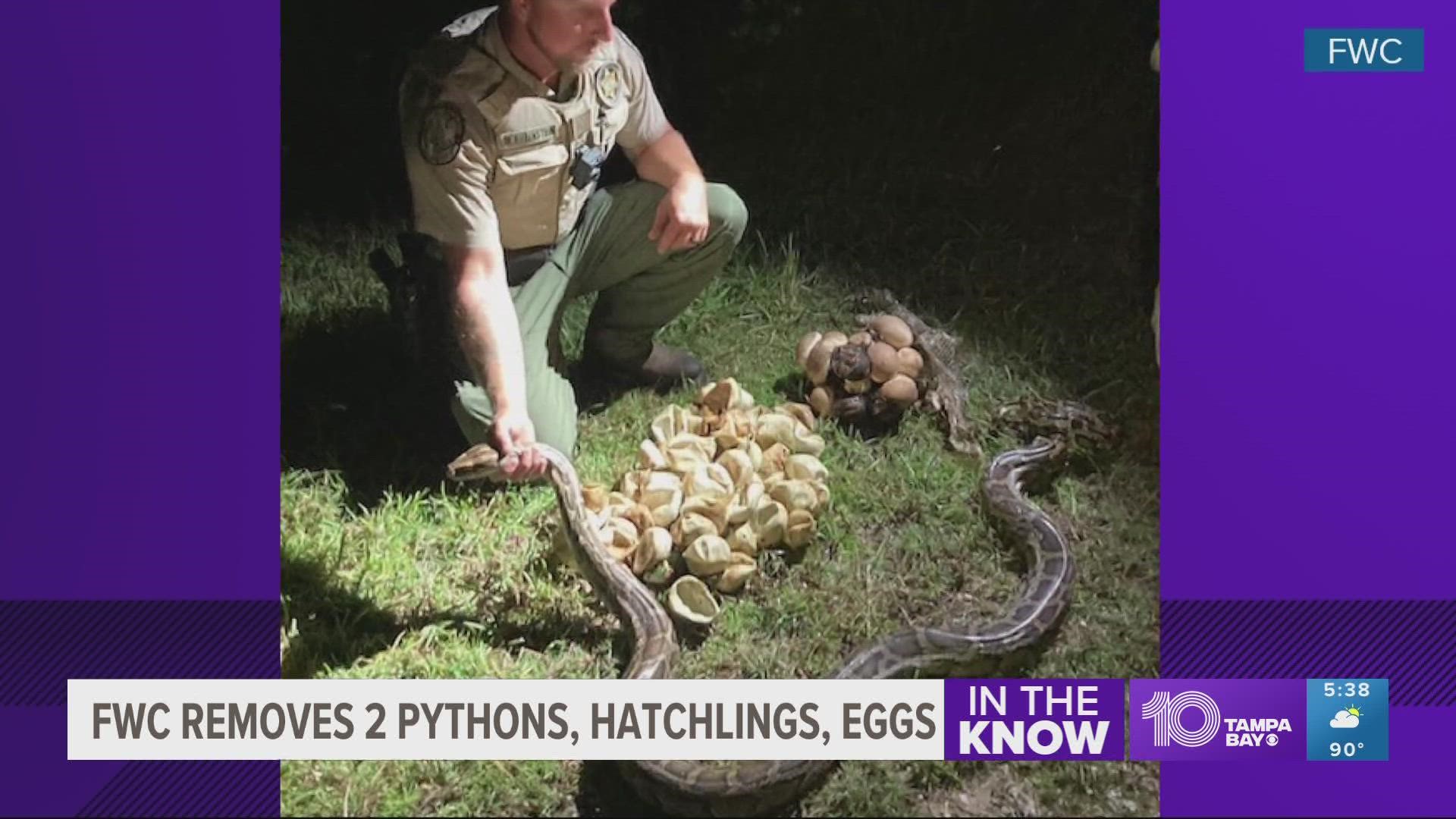OCHOPEE, Fla. — Earlier this week, two female Burmese pythons, a clutch of eggs and python hatchlings were found and removed from Big Cypress National Preserve, the Florida Fish and Wildlife Conservation Commission announced in a statement.
FWC says a South Florida Water Management District python removal contractor, Alex McDuffie, and FWC Officer Matthew Rubenstein found a female Burmese python on a nest containing 23 unhatched eggs and 18 additional python hatchlings Monday night.
A day later, McDuffie found a second breeding female that measured to be 17 feet and 6 inches long in the same area.
According to NPR, the snakes were once a popular pet in Florida in the 1970s and 80s. The article states, "once these animals grew past their manageable 3 to 4 feet as babies to over 10 feet, they suddenly weren't so fun to own, Donna Kalil, a Florida-based python hunting professional said. "So owners would release them out into the wild."
However, these snakes quickly became an issue affecting Florida's native species.
According to the U.S. Geological Survey, these non-native pythons are one of the most concerning invasive species in the Everglades National Park because of their link to certain animal population declines.
"The most severe declines in native species have occurred in the remote southernmost regions of Everglades National Park, where pythons have been established the longest," the U.S. Geological Survey explains on its website. "In a 2012 study, populations of raccoons had dropped 99.3 percent, opossums 98.9 percent, and bobcats 87.5 percent since 1997. Marsh rabbits, cottontail rabbits, and foxes effectively disappeared."
To combat these declines, the FWC launched the Python Challenge back in 2013.
The challenge is a conservation effort aimed toward helping protect the Everglades' habitat and the animals that live there from these invasive snakes. The event, held every year, will run from Aug. 5-14.
Starting now, people wanting to participate can take the required online training and become registered. By removing Burmese pythons from the wild, people can compete to win cash prizes.
The person who removes the most pythons will receive a prize of $2,500, while the individual who removes the longest python will get $1,500.
Anyone interested in signing up to take part in the 2022 Florida Python Challenge can visit flpythonchallenge.org.
"This [challenge] is something that will benefit this ecosystem, it will benefit the entire state of Florida, and we're really excited to be able to launch this," Florida Gov. DeSantis said.
The challenge allows the public to help engage head-on to help with the problem of the invasive species in the Sunshine State, according to the governor.
“The Everglades is one of the world’s most prized natural resources, and we have invested record funding for Everglades restoration projects, including record funding for removal of invasive Burmese pythons which wreak havoc on the ecosystem,” DeSantis said in a statement.
“Because of this focus, we have removed record numbers of invasive pythons from the Everglades. I am proud of the progress we’ve made, and I look forward to seeing the results of this year’s Python Challenge.”
The FWC encourages people to remove and kill pythons from private lands whenever possible.
Florida has been working hard on removing pythons for years. The governor recently signed the Freedom First budget, which has an investment of up to $3 million for python removal efforts — including research and development of technology to detect the snakes.
Burmese pythons aren't native to Florida and are found primarily in and around the Everglades ecosystem. The snakes usually eat birds, mammals and other reptiles.
For more information on Burmese pythons, visit MyFWC.com/Python.

